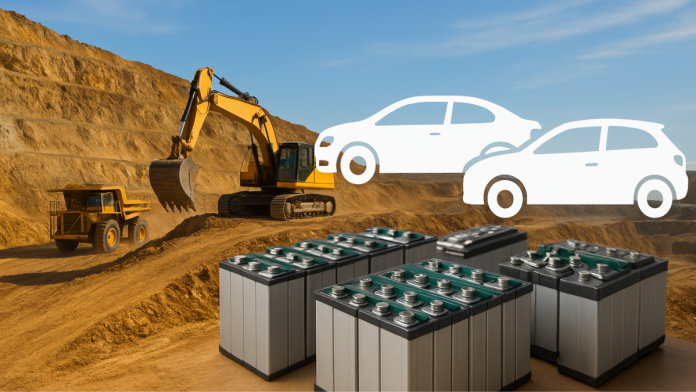China’s electric vehicle (EV) battery industry is facing a powerful shake-up. The world’s largest battery maker, CATL, has stopped production at one of its biggest lithium mines, the Jianxiawo mine, after its permit expired. This sudden halt has caused lithium prices and related stocks to soar, sending ripples through global markets. This move suggests that China’s government may be taking serious steps to reduce too much production in the EV sector, which has been struggling with falling demand and oversupply.
Major Lithium Mine Shutdown Signals Change
Over the weekend, CATL stopped operations at the Jianxiawo mine, one of the largest sources of lithium, a key metal needed for making batteries used in electric cars. This shutdown surprised many people and created hope that the Chinese government might now start limiting lithium production more widely.
Too much lithium supply has been a big problem. Since lithium prices reached their highest point in 2022, they have dropped nearly 90%. This big price fall happened because there was much more lithium being produced than needed, while demand for electric vehicles slowed down.
Because of this, lithium companies and battery makers have been fighting tough price wars, lowering prices to sell their products, which is making it harder for businesses to make money. The Chinese government has promised to tackle this problem by controlling how much is produced in industries where there is too much supply.
After the mine closure news, lithium prices jumped sharply. Shares of major lithium companies such as Tianqi Lithium and Ganfeng Lithium in Hong Kong rose by double digits. On the futures exchange in Guangzhou, lithium prices hit their daily limit increase right at the market opening. This sudden price rise shows how important the shutdown of this mine is to the market.
Chip tithe to Uncle Sam — US cashes in as Nvidia, AMD pay 15% for China AI sales licenses
What This Means for China’s EV and Battery Industry
China’s battery metal hub, around the city of Yichun, is being closely watched now. Traders and industry leaders expect that the government might announce more limits on lithium mining soon. The goal is to stop oversupply and help bring prices back up to healthier levels.
Oversupply not only hurts producers but also causes “deflationary pressures,” meaning prices keep falling, which can slow down economic growth and create problems for many companies. China’s leaders, including the powerful Politburo, have already said they want to fix these issues in key industries.
The EV market itself has cooled down after rapid growth in recent years. Fewer people are buying electric vehicles now, which lowers the demand for batteries and lithium. This creates an imbalance since the supply of materials is still very high.
CATL’s mine suspension is a clear sign that Beijing is ready to act to control the situation. It is likely that more production cuts and permit reviews could follow in the coming weeks or months.
Global Political and Economic Updates
In other news, Australia announced it will formally recognize the Palestinian state in September. This decision aligns Australia with countries like France, the UK, and Canada, moving away from the US position. The move is seen as supporting peace efforts in the Middle East. Australia’s Prime Minister said a two-state solution is humanity’s best hope to end conflict and suffering in Gaza.
Trump calls for Intel CEO Lip-Bu Tan to resign over alleged China military ties
In China’s real estate market, another big developer, China South City, has been ordered to shut down. It was the largest builder to be wound up since Evergrande. The Hong Kong High Court rejected its last attempt for restructuring. This shows China’s property crisis is still very serious. Even UBS, a major bank, says the property slump will last longer without more government support.
India’s central bank has been selling billions of US dollars to support its currency, the rupee. The rupee recently dropped close to its lowest value ever after US President Donald Trump doubled tariffs on Indian goods, increasing the cost to 50%. This move was in response to India’s purchases of Russian oil.
President Trump also urged China to quadruple its purchases of American soybeans. This message was posted on Truth Social and came a day before a trade truce was set to expire. After this, soybean futures in Chicago jumped by nearly 3%, the biggest gain in four months. Trump also thanked Chinese leader Xi Jinping in the post, without giving details.
Regional Security and Business Highlights
Tensions rose in the South China Sea when a Chinese ship used a water cannon against a Philippine vessel near Scarborough Shoal, a disputed area. The Philippine Coast Guard said Chinese ships blocked and threatened their fishermen. The China Coast Guard accused Philippine ships of entering their waters despite warnings. Philippine President Ferdinand Marcos Jr. condemned the actions.
Brazil Ditches the Dollar: Launches First-Ever Panda Bond in China’s Yuan
In Hong Kong, Chinese vaccine maker Ab&B Bio-Tech had a stunning stock market debut. Its shares climbed as much as 169% on the first day of trading. This was one of the biggest gains in recent times and showed strong demand among small investors. Ab&B was the last company to go public before new Hong Kong listing rules limited shares for retail investors.
Finally, a top executive from Chinese EV maker XPeng, Brian Gu, and his wife, Wenisa Ma, bought a HK$171 million (about $22 million) mansion in Hong Kong’s prestigious Jardine’s Lookout area. This purchase adds to Gu’s growing property portfolio in the city.
